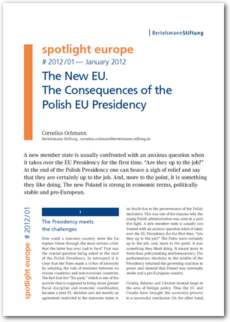The Presidency meets the challenges
How could a non-euro country steer the European Union through the most serious crisis that the latter has ever had to face? That was the crucial question being asked at the start of the Polish Presidency. In retrospect it is clear that the Poles made a virtue of necessity by adopting the role of mediator between eurozone countries and non-eurozone countries. The fact that the “Six-pack,” which is one of the accords that is supposed to bring about greater fiscal discipline and economic coordination, became a joint EU decision and not merely an agreement restricted to the eurozone states is no doubt due to the perseverance of the Polish mediators. This was one of the reasons why the young Polish administration was seen in a positive light. A new member state is usually confronted with an anxious question when it takes over the EU Presidency for the first time. “Are they up to the job?” The Poles were certainly up to the job, and, more to the point, it was something they liked doing. It meant more to them than policymaking and bureaucracy. The parliamentary elections in the middle of the Presidency returned the governing coalition to power and showed that Poland was internally stable and a pro-European Country.



